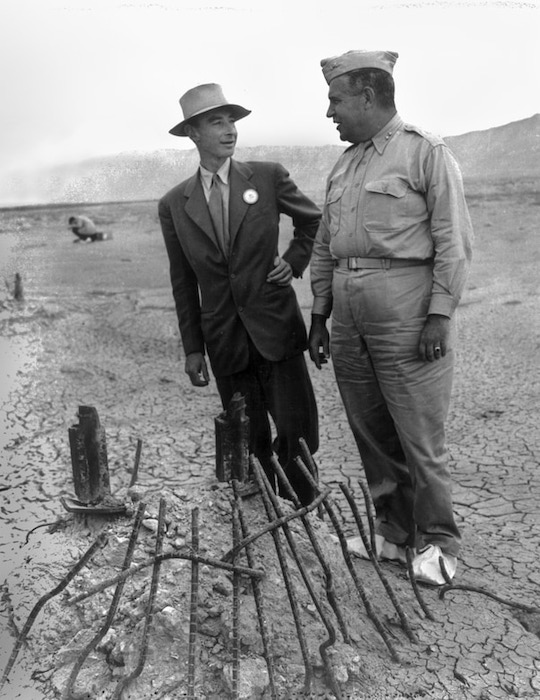Oppenheimer
When a movie is three hours long, it had better be a timeless epic like David Lean’s 1962 masterpiece Lawrence of Arabia or Sergei Bondarchuk’s 1966–67 spectacular cinematic rendering of War and Peace.
Well, along comes Christopher Nolan and a lengthy opus entitled Oppenheimer.
It’sa biography of the brilliant, mercurial American scientist whose fingerprints are all over 20th-century physics, as well as a key man in the saga of how America developed the atom bomb during World War II, via the Manhattan Project.
In this movie, there’s serious intelligence on display; nothing artificial about it. So let’s review the effort and see where it takes us.
Nolan’s movie script is an adaptation of a 2005 book, American Prometheus: The Triumph and Tragedy of J. Robert Oppenheimer, by Kai Bird and Martin Sherwin.
Oppenheimer was indeed an “American Prometheus,” a heroic figure who led the effort to reveal nature’s inner nuclear secrets. And in the end, just like what happened with ancient Prometheus who stole fire from the gods, both individuals were severely punished for their works.
It tells the tale of the American scientist who placed nuclear fire into a bottle.
Three Decades of Events
Oppenheimer bounces across time and place, beginning in 1959 in Washington, D.C., during the course of hotly contested Senate hearings over confirming a man named Lewis Strauss to President Eisenhower’s cabinet.
In the late 1940s and early ’50s, Strauss and Oppenheimer had issues, and Strauss carried a grudge. In 1954 Strauss arranged to strip Oppenheimer’s security clearance, essentially ending the man’s days as an insider within the nuclear biz.
And in 1959, payback loomed for Strauss, although we must await the end of the movie to see that particular drama play out.
From those Senate hearings, the film flashes back through three decades of events, beginning in 1926, when Oppenheimer was a graduate student at Cambridge.
An important segment transports viewers to late-1930s Berkeley and its openly communist social and academic milieu. It was the Great Depression, of course, and all the smart, fashionable people were certain that capitalism had failed, and Soviet communism was the wave of the future.
In this sense, if you were Oppenheimer, sure… why not subscribe to the Daily Worker, send money to the Communist Party, hang out with Commie friends, marry an ex-Communist and even fool around on the sly with those easy Communist women?
Back then, that’s what all the cool kids were doing.
Oppenheimer Was a Genius
Other Oppenheimer scenes occur in the middle of nowhere, in New Mexico in the 1940s, at what would become the Los Alamos National Laboratory. And for all the importance of this particular locale, Nolan fails to explain the origins.
Namely, that Oppenheimer suffered from tuberculosis as a youth, and went to the high, dry desert mesas of New Mexico to recover. Over time, he grew to like it there and bought a local ranch.
All this and more, as the movie presents many other scenes in different places and times, far too many to detail here because, as previously noted, the film is epic in scope.
Throughout the film, Nolan hammers home the point that Oppenheimer was brilliant, certainly in physics but also in many other ways. Yes, Oppie excelled in math and science, but he was also a scholar in other fields.
He spoke several languages, read voraciously and could converse at the highest levels with experts on the most arcane of topics.
On his security questionnaire for the U.S. Army, Oppenheimer admitted to being “a member of just about every communist front organization on the West Coast.” He would later claim that he was just (sort of) kidding, but FBI surveillance records from his days partying with the Berkeley reds pretty much spoke for themselves.
Still, Oppenheimer was Oppenheimer and America needed him to work on the bomb. Groves reviewed the files, spoke with Oppie and summarily waived him into the sanctum nuclear sanctorum.

Robert Oppenheimer and Gen. Leslie Groves at Trinity, site of first atomic blast. U.S. Department of Defense.
Your Services Are No Longer Needed
There’s a telling scene in the movie, from just after the first successful nuclear test in the desert of New Mexico. Oppenheimer walks into a room where Army officers are sitting at desks, performing calculations on nuclear effects. Oppie offers to help, and a very polite captain says, “It’s OK, sir. We’ve got this.”
In other words, Oppenheimer and his team had fulfilled their task and were no longer needed. That is, once the underlying science was proven, the Manhattan Project transformed into a military-industrial project to produce more bombs.
And in a Promethean level of subtle irony, Oppie’s former ranch at Los Alamos became ground zero for Big Government to get into the business of Big Science, building Big Weapons.
When the war ended, Oppenheimer remained involved in nuclear physics, although more at the political levels than in fundamental science. In the late 1940s, he took a position at Princeton’s Institute for Advanced Studies.
In 1954 when Oppie’s security clearance was due for renewal, his 1930s-era communist elbow-rubbing came back to haunt him, along with other security scandals from the Manhattan Project, to include the physicist-spy Klaus Fuchs and the Rosenberg spies, who also spirited secrets out from Los Alamos.
In the anti-communist environment of the early 1950s, Oppenheimer was denied from retaining his security clearance.
Which brings us back to the Prometheus analogy. That is, despite his labors to bring nuclear physics to the forefront of American science, and his work to develop the atom bomb for his country, in the end Oppenheimer was cast out from the temple of government science.
Without further clearance to work on the biggest of the big physics projects being run by the Atomic Energy Commission, Oppenheimer was a mere outsider looking in.
Like ancient Prometheus who was tortured for bringing fire to mankind, modern Oppenheimer too was banished by the bureaucracy of a program that he helped birth.
The movie is three hours long, but remains suspenseful throughout. Brilliant filmmaking. The acting performances were also superb, some Oscar-worthy.
In all, Oppenheimer is an epic film that I highly recommend to anyone with an interest in this fascinating period of American history.
At one steamy point, Oppie recites Sanskrit poetry as he seduces a woman who happened to be an ardent Communist, forming a mutually destructive relationship that would haunt the physicist well into his days building atom bombs, and then long afterward.
The point is, Oppenheimer was a brainiac polymath far beyond his Ph.D. in quantum theory, which he wrote in flawless, academic German. Indeed, he was scary smart such that one professor who examined Oppie for his doctorate reportedly said, “I’m glad that’s over. He was on the point of questioning me.”
Young Prometheus
Our Prometheus-to-be was born in 1904 in New York City, into a nonobservant Jewish family in which the father had done quite well in business. Young Oppie lived a comfortable and privileged life, and attended rigorous private schools.
Oppenheimer burned through the science program of Harvard College in three years and achieved graduate-level status in physics before exiting summa cum laude. He went off to Cambridge to study more physics but was bored there because the real “quantum” action was in Germany at the time.
So Oppie transferred to the University of Gottingen for his Ph.D., awarded in 1927 at the astonishingly young age of 23.
For the next 15 years, Oppenheimer was a scientific nuclear dynamo. He lectured in physics at universities in Europe and the U.S. and was recruited by Harvard, Caltech, Berkeley and others.
Now, fast-forward to 1942, when President Roosevelt approved a massive scientific-industrial program to build an atom bomb. But there was but a small handful of people who could even dream of leading such an effort, and the top name on everyone’s list was Prof. J. Robert Oppenheimer.
When his country called him to build a bomb — he was brusquely summoned by then-Col./eventual Gen. Leslie Groves, head of the Manhattan Project — Oppenheimer answered, with enthusiasm. He plunged into the work, but first came certain bureaucratic niceties.



Comments: